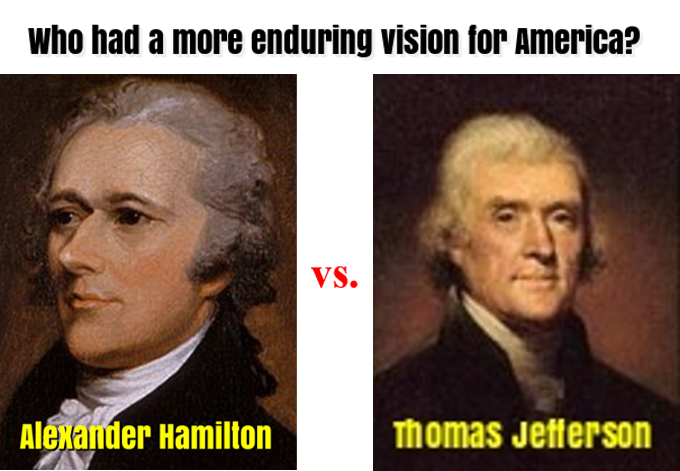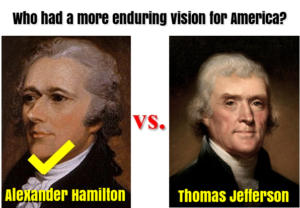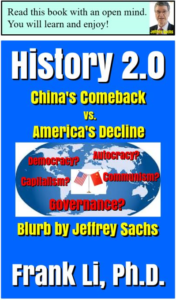Among America’s Founding Fathers, no one has seen his fortune rise more dramatically over the past few years than Alexander Hamilton. Two highlights:
- “Hell” in 2015: Woman to replace Alexander Hamilton on $10 bill.
- “Heaven” in 2018: Behind the Broadway Smash “Hamilton”.
But I think he deserves much more attention and recognition, particularly in terms of having an enduring vision for America, especially when compared with Thomas Jefferson.
1. Jefferson’s vision for America
It can be highlighted in four points as follows:
- Government: A loose union with a small and limited Federal government, leaving the people, including state and local governments, alone (aka “self-governing”).
- Economy: A strong economy with agriculture.
- Military: No standing army, but armed militia groups all over the country, thus the Second Amendment to the U.S. Constitution.
- Church and state: Separated.
2. Hamilton’s vision for America
It can be highlighted in four corresponding points as follows:
- Government: A tight union with a strong Federal government.
- Economy: A strong economy with industry, commerce, and finance (e.g., money, banking, and debt control).
- Military: A standing army.
- Church and state: Separated.
3. The key difference between Hamilton and Jefferson
Hamilton wanted to create a strong union, hopefully matching Britain in power eventually. On the other hand, Jefferson wanted a minimalist Federal government for a “country of nature”, as highlighted below.
4. How did they fight it out?
George Washington, the first American President and a Federalist (just like Hamilton), balanced well between Hamilton, the first Secretary of Treasury, and Jefferson, the first Secretary of State.
Hamilton ran Treasury very well and laid a solid financial foundation for America. For example, he created a central bank, which first assumed all the war debts of the 13 states and then paid them off. It was a good step toward building a strong Federal government.
However, Jefferson was always there as a counterforce against Hamilton. Jefferson was in government throughout the eight years of the Washington administration and also throughout the four years as the Vice President for John Adams.
The key difference between Hamilton (supported by John Adams) and Jefferson hit its peak in the 1800 election. This is highlighted by the image below.
The debate between the Federalists and the Democratic-Republicans was completely over by 1816. It was ended by eight years of the Jefferson Presidency, followed by eight years of the Presidency under James Madison, a well-known disciple of Jefferson.
This is why America has been widely regarded as Jeffersonian so far. However, some have argued that “We live, without question, in Hamilton’s America” (Whose Vision of America Won Out – Hamilton’s or Jefferson’s?). This argument is mostly academic, and not widely accepted. But it does have some very valid points. For example, Jefferson made full use of the solid financial foundation laid by Hamilton, especially in territorial expansions (e.g., Louisiana Purchase). This was against his own vision of a minimalist government.
5. Closing
There is no way to know how a Hamiltonian America would have turned out without Thomas Jefferson. But everything considered, especially given America’s deeply rooted trouble today, I think Hamilton had a more enduring vision for America than Jefferson did.
For more, read Has Jeffersonian America Run Its Course?
More broadly, read History 2.0 – China’s Comeback vs. America’s Decline.





WE have to Focus on today’s problems… not mistakes made in the 1800’s.
Very interesting articles from Mr. li. I’m thinking the conflict between the individual liberties preserved in the Bill of Rights and the socialist collective oppression and malicious intent of the super rich is leading to civil war. I hope I’m wrong, but the trovrs of information and misinformation support my opinion.
Was the CONSTITUTION, the vision the Founding Fathers had for America, the 1800’s “mistakes” to which you refer that leads to the problems of today? Or, is CORRUPTION, or the perversion of the Constitution, and/or is it just plain and not so simple Malicious greed that gives us our present day predicament, Edna?
The country was founded by/of/for the super-rich (i.e., top 1%), with money behind everything, especially in politics, and remains so today! https://econcurrents.com/2022/02/06/what-is-the-american-revolution-anyway/